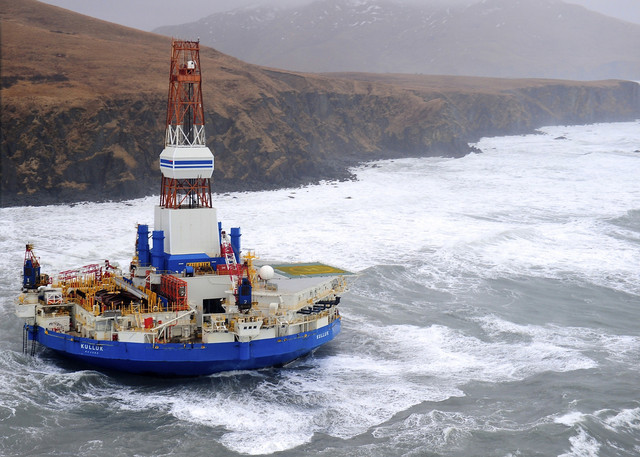The operator of Shell Oil Corporation’s two Arctic drilling rigs, deployed in Alaska in 2012, has pleaded guilty to eight felony charges for environmental and health and safety violations during its operation of the rigs. Noble Drilling has agreed to pay $12.2 million dollars in fines and community service payments.
According to the judgement by the US Department of Justice, the vessels Noble Discover and Kulluk were involved in operations that contravened federal law thereby committing a series of environmental and maritime offences. These included “knowingly failing to maintain an accurate Oil Record Book and an accurate International Oil Pollution Prevention certificate,” “knowingly failing to maintain a ballast water record book” and knowingly and willfully failing to notify the U.S. Coast Guard of hazardous conditions aboard the drill ship Noble Discoverer.”
Greenpeace has responded to the news by pointing out that this isn’t the first time the global oil corporation has violated the regulations. In April 2014, the US Coast Guard accused Shell of ignoring safety warnings and moving one of its drilling ships in the Arctic, partly in a bid to evade paying tax. The allegation by the Coast Guard was included in its official report investigating why the Kulluck ran aground in December 2012. The most significant factor, said the report, which has been published by the US Department of Homeland Security, was the “inadequate assessment and management of risks associated with a complex vessel movement during the winter in the unique and challenging operating environment of Alaska.”
“Shell has proven time and again it can’t be trusted to manage its contractors safely” said Greenpeace Arctic campaigner Ian Duff. “That Shell engaged Noble Drilling, a company now guilty of eight felonies, is the clearest indicator yet. Letting Shell back into such a precious and risky environment as the Arctic would be sheer madness, yet that’s what Shell wants to do next summer. Surely now President Obama has to think twice about approving Shell’s next venture in the Arctic, which the government’s own scientists say has a 75 percent chance of causing a large spill.”
Conducting operations in these waters at this time of year involves extreme risks from giant floating icebergs and stormy seas. Furthermore, the Arctic region’s remoteness and extreme climate together with dynamic sea ice exacerbate the risks and consequences of oil spills and complicates cleanup operations in the event of a disaster. According to another report by the Pew Charitable Trusts, oil spill contingency plans generally underestimate the probability and consequence of catastrophic blowouts, particularly with regard to drilling in the Arctic Ocean. An oil well blowout in this region could devastate an ecosystem that is already under stress and cleanup technologies and systems are, as yet, unproven in the Arctic Ocean environment.
Despite these concerns, the company has pressed ahead with plans to conduct exploratory operations in the Arctic in 2015.
One senior US politician has recommended that Shell be punished for its ‘reckless’ behaviour.
A Shell spokesman said the company was still reviewing the report but had already implemented lessons learned from an internal review of its 2012 operations.
By Robin Whitlock
